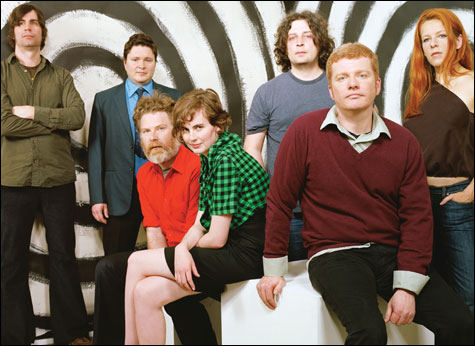
MASS ROMANTICS: ‘You shouldn’t have to be afraid to slow things down. . . . You can’t be a party band forever.’ |
“One guy was talking to me about the song ‘Challengers,’ ” Carl Newman says of the title track to the new New Pornographers disc, “saying, ‘My wife thinks it’s so sad; two people are never going to get together even though they’re in love.’ ” Newman shakes his hands back and forth in mock alarm. “ ‘No, no, tell your wife the two people in the song get together eventually.’ ”And they did: Newman tells this story a few days before he’s to be married. It’s a love that’s all over Challengers (Matador), in ways both conspicuous — “Go Places” is his most overt love song — and subtle, as in the relocation of some of the band’s operations from Vancouver to his bride’s leafy Brooklyn neighborhood. What’s funny about Newman’s story — and he’s in on the joke — is that you can’t blame that guy’s wife for her interpretation of the song. As celebrations of love go, “Challengers” sounds like an awfully sad one. Which is probably why it rings so true.
“Songs that have a sad note are always my favorite, like ‘The Devil’s Eyes’ by the Go-Betweens,” he explains. “It’s sad, but there’s hope, like no matter what shit goes down, we’re going to be all right.”
The same could be said for the New Pornographers: they’re bound less by shared rock ambition than by a certain kind of love, and so they’re less affected than most bands would be by the fact that their main songwriter and frontman has moved across the continent. As bassist John Collins said around the release of their 2003 second album, Electric Version (also Matador), “Carl just doesn’t write a bad song.”
Sometimes touted as a Canadian supergroup, or, more ambiguously, a “collective,” they all have side interests. Bassist John Collins is a producer and keyboardist; Blaine Thurrier is a filmmaker; Newman released a well-received solo record, The Slow Wonder (Matador), in 2004; Dan Bejar, the group’s other songwriter, has his own band, indie fave Destroyer, and has never toured with this one; Neko Case has found her vocal cords and her voice as a solo artist and in some circles has eclipsed the New Pornographers. And yet the band thrive. “It’s just the nature of the band,” Newman says. “Even though it’s our jobs, it’s really low-key.”
This confounding of rock orthodoxy simply happened. “In the beginning, it took two and a half years to make [their 2000 debut] Mass Romantic, just because we didn’t have any money or a label. I was asking John if he could produce it for free, on spec. Not even real spec, because no one had specced it for anything — it was speculation that he’d be doing it for free. So this had to wait whenever he had a paying gig, which is a much bigger hassle than that everybody’s very busy now, because now at least it’s a priority — for most of the people, it’s their primary source of income.
“I mean, when people say it’s a collective, I’m like, ‘Whoa.’ They think we’re sitting cross-legged in a circle planning our next year, deciding who’s going to do what chores.”
Newman’s often acerbic wit has sweetened a bit. A successful band and a successful relationship will do that. The effects of a happier Carl Newman on the music, however, are incidental. Challengers is the quietest New Pornographers record yet, but each release since the joyously fractious Mass Romantic has been progressively more subdued, and that, like a penchant for melancholy, is what moves him as a songwriter. His lyrics have always been on the inscrutable side, so indie sleuths would do better not to think of this as his American Album.
“It’s not like when I’m writing anywhere I’m walking the streets taking in the ambiance. I write at home in my apartment with my guitar. I moved to Brooklyn for this girl I loved, so there are three or four songs that are stories about that, but it could have just as easily been about any other city.”
The most New York song on the record is in fact Bejar’s “Myriad Harbour,” a typically (for Bejar) sexualized reflection on the city, complete with references to specific corners. Newman speculates that it was a reaction to his move. (Elsewhere, in “The Spirit of Giving In,” Bejar sings, “I was sick of America and her screaming decay.”) But Newman — bemusement at the good-natured jab aside — doesn’t parse Bejar’s lyrics, any more than he’d want others to delve too deeply into his own.
“There are songs on this that are very clearly love songs. It’s still not really clear, nothing says, ‘I love you because you have pretty green eyes, but I am trying to say that in a poetic way.’ There’s some songs where I’m trying to do that, like, ‘Go Places.’ It still comes off as a little strange.”